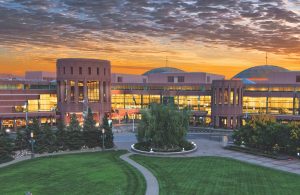
The Minneapolis Convention Center — scheduled to host the 2020 General Conference — announced it is now cancelling gatherings of 50 or more people through May 10. Before the convention center’s decision, the Commission on the General Conference had scheduled a teleconference March 21 to consider postponement of The United Methodist Church’s top legislative assembly. Photo by Dan Anderson, courtesy of Meet Minneapolis and the Minneapolis Convention Center.
By Heather Hahn –
With the coronavirus disrupting lives worldwide, General Conference organizers determined they have no choice but to postpone The United Methodist Church’s top legislative assembly.
The Minneapolis Convention Center – scheduled to host the 2020 General Conference – cancelled gatherings of 50 or more people through May 10. The shutdown covers the first five days of the denomination’s 10-day meeting, which was set to draw 862 delegates, 66 bishops, and others from four continents.
“This news is not unexpected based on the current guidance from health officials and we expect to move forward with new plans as quickly as possible,” Kim Simpson said in a statement. She is the chair of the Commission on the General Conference that plans the big meeting.
The commission’s executive committee, which met by teleconference March 18, decided the venue’s announcement meant that General Conference could no longer go forward May 5-15 as planned. However, commission members do not yet know how quickly they can announce new dates.
The convention center said it made its decision based on guidance from the Minnesota Department of Health “to protect the public’s health and slow the rate of the transmission of COVID-19.”
“Each week, we will seek guidance from MDH on changes to this policy or in the end date,” the convention center added. Before the convention center’s decision, the full Commission on the General Conference had scheduled a teleconference to consider a possible delay.
The Council of Bishops executive committee requested postponement March 13 in response to the life-threatening virus and increasing travel restrictions that might prevent nearly half of the delegates from reaching the U.S. About 43 percent of General Conference delegates come from Africa, Europe or the Philippines.
Bishop Bruce R. Ough, who leads the Minnesota and Dakotas conferences, is a member of the bishops’ executive committee. “I believe the safety of the delegates and the fairness of the conference’s legislative processes are paramount,” Ough said.
“The Dakotas-Minnesota Area has worked very hard to extend extraordinary hospitality to the General Conference delegates and guests. If the Conference is postponed, there would, of course, be disappointment. However, this disappointment would not dampen the area’s openness to working with the Commission on the General Conference to reschedule the event in Minneapolis.”
As of April 20, Johns Hopkins University — which is tracking cases — reported that the coronavirus had infected 2.4 million people and killed more than 166,000 worldwide. In the U.S., more than 41,000 people have died from COVID-19.
“The health and safety of participants, as well as their families and communities, is a primary concern. This includes our concern for the Minneapolis area,” General Conference organizers said in a joint email to UM News. The leaders include Simpson, the Rev. Gary Graves, General Conference secretary, and Sara Hotchkiss, business manager.
“We also want to do all that is within our power to ensure that all delegates are fully able to participate in the many important decisions we are currently facing as a church,” they said.
Under The United Methodist Church’s constitution, General Conference is to meet every four years “at such time and in such place” as determined by General Conference itself or “by its duly authorized committees.” The General Conference commission, which is elected at General Conference, is that duly authorized committee. Only the full commission is able to set a new date or decide on an alternate plan.
The convention center’s announcement means that the church will not incur significant financial penalties for cancellation of the contract.
General Conference is not like a typical church meeting or worship service, some of which have already moved online because of the virus.
The 10-day international legislative meeting resembles a session of the U.S. Congress with elements of a United Nations general assembly.
Multiple interpreters work with hundreds of delegates throughout the gathering to translate proceedings. During the first week of General Conference, delegates meet simultaneously in different legislative committees – 14 were planned for this year. The delegates then come together to vote in plenary during the second week. All votes are by secret ballot, using secure voting devices of limited range. Many delegates come from countries where internet connections are unreliable, if available at all. The logistics of General Conference involve obtaining hundreds of visas and reserving hotel rooms, flights, and the venue needed for more than 1,000 people.
For this year’s gathering, the General Conference commission also was adding stricter requirements for credentialing after an investigation found four ineligible people cast votes during the 2019 General Conference using credentials of absent delegates.
General Conference organizers and the bishops acknowledge the legislative assembly scheduled this year comes at a particularly sensitive time for the church. United Methodists have submitted multiple proposals to resolve the denomination’s longtime debate over homosexuality by splitting the denomination.
General Conference also faces other critical decisions such as setting the denomination’s four-year budget and electing numerous leaders including the members of the Judicial Council, the denomination’s top court.
“We will be moving forward responsibly and that includes a number of complex matters that must be planned for,” General Conference organizers told UM News.
Heather Hahn is a multimedia news reporter for United Methodist News.






0 Comments